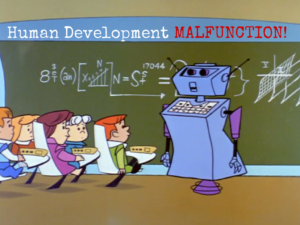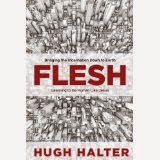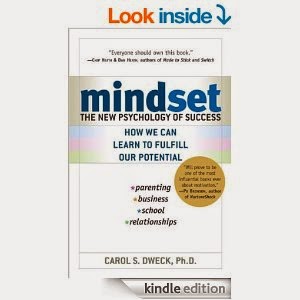
When my son was four he had an obsession with robots. As I thought about it more and the more I learned about robots through his inquiry, I found that I too was compelled by robots. The idea of having complete control over the output of a subject is deeply desirable. The process of achievement becomes quite simple. I input instruction/information appropriately and “BAM!” the desired output is displayed.
But, as a teacher and parent; Healthy, productive learning CAN NOT be a robotic process! If it did turn into that, the result would be…as my son would say in his best robotic voice, “MALFUNCTION! MALFUNCTION!” Test-driven, boxed/scripted curriculum aims to remove all variables from the learning process, including human interaction. In teachable/learning moments, holding tight to our humanity might be the most important aspect for growth. The inability of students to relate, interact, and reflect with those around them severely inhibits their ability to grow and successfully function in a human society.
What Makes Us Human?
Imperfections, unpredictability, vulnerability, emotions, uniqueness, etc. In a time where it has become a difficult task to connect with the young generation, we must cherish our humanity, using these human-specific characteristics to engage and connect with our children. A classroom where the teacher is always right and preoccupied with the information would be far from an environment conducive to learning.
Which classroom would create the best learning environment?
|
|
|
The most frustrating encounters I’ve had with students is when he/she is blinded from the possibility to look around themselves and learn from their available resources. At some point in a child’s development he/she reaches a stage where they rule anything less than perfection as failure. I believe this may be a learned attribute from adult models putting on a façade of holiness instead of cherishing our humanity and uniqueness.
We Are Designed to Connect Relationally
It’s a loaded concept to consider that our Creator has made us in His image, reflecting his nature (Gen. 1:26-27). An article in Relevant Magazine explains this quite clearly. There are two sidenotes in the article that sum it up well.
1. “The very essence of God is relational, and that essential quality has been imprinted on us.”
2. “To be fully human is to fully reflect God’s creative, spiritual, intelligent, communicative, relational, moral and purposeful capacities.”
The most pleasing thing and his deepest desire is to maintain a personal relationship with His children. For some reason with both education and faith we like to attempt to take the humanity out of the equation. We try to construct empty religious rituals and standardized tests so that we can clearly measure and judge performance. This works against our nature and therefore stalls growth and development.
Dive Into the Deep End
Hugh Halter in his book Flesh: Bringing the Incarnation Down to Earth says this, “If you want a safe faith, you will never really know God because He does not hang out in the shallow end much.” I want my classroom to be known as the deep end, where everyone invests and commits to not only their own learning experience but to the whole community sharing the waters. I think education would be much more powerful if we dive in as a learning community, valuing and respecting those around us, relying on one another. Individualized education does not equate to isolation. We learn a lot more about ourselves when we experience learning with others.
If our purpose is to prepare students for life then I believe connecting and empathizing with the perspectives of others is more important than holding an abundance of information.
Peace in exploring the deep waters.

Flesh: Bringing the Incarnation Down to Earth by Hugh Halter |

